วิเศษณานุประโยค (Adverbial Clause) ในภาษาอังกฤษมักใช้เพื่อขยายคำกริยา คำคุณศัพท์ หรือ คำวิเศษณ์อื่นๆ งั้น adverb clause มีอะไรบ้าง วิเศษณานุประโยคมักอยู่ตรงไหนในประโยค มาเรียนรู้อย่างละเอียดกับ ELSA Speak ในบทความด้านล่างนี้เลยนะ
Adverbial Clause คือ?
วิเศษณานุประโยค (Adverb Clause or Adverbial Clause) เป็นกลุ่มคำที่ทำหน้าที่เหมือนคำวิเศษณ์ กล่าวอีกนัยหนึ่ง อนุประโยคนี้อธิบายหรือขยายคำกริยา คำคุณศัพท์ หรือคำวิเศษณ์อื่นๆ แตกต่างกับอนุประโยคที่พบบ่อย วิเศษณานุประโยคจะขึ้นอยู่กับประโยคเสมอ – หมายความว่ามันจะอยู่เดี่ยวๆเป็นประโยคเดียวไม่ได้
สอบก่อนเข้าฟรี

Adverb clause ตัวอย่างประโยค :
- He participates in club activities weekly. (เขาเข้าร่วมกิจกรรมของสโมสรทุกสัปดาห์)
=> He participates in club activities after he’s done with classes every Wednesday. (เขาเข้าร่วมกิจกรรมของชมรมทุกวันพุธหลังเลิกเรียน)
- Eagerly, my cousin agreed to the proposal. (ลูกพี่ลูกน้องของฉันยินดียอมรับข้อเสนอนี้)
=> As dollar signs flashed in her eyes, my cousin agreed to the proposal. (เมื่อนึกถึงความคุ้มค่า ลูกพี่ลูกน้องของฉันก็ยอมรับกับข้อเสนอ)
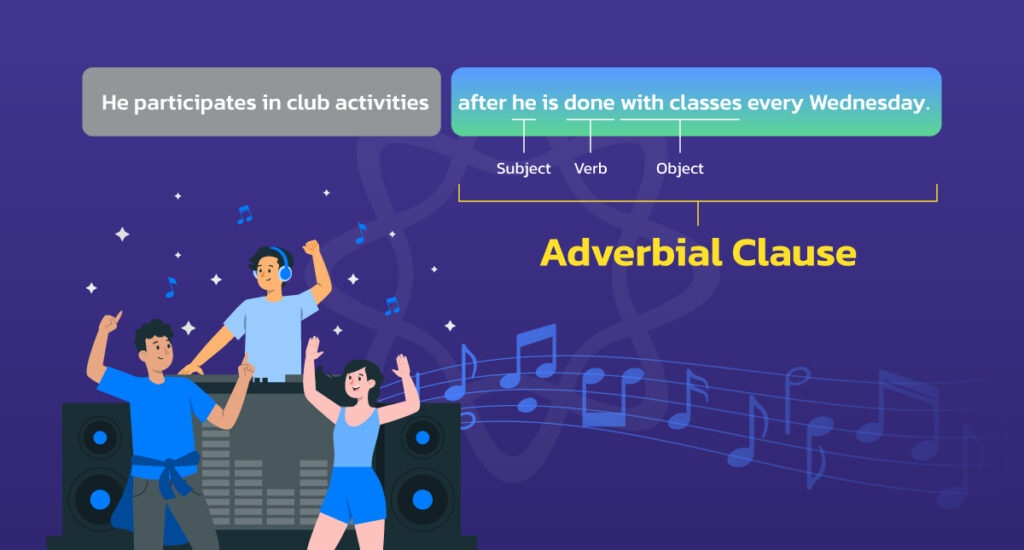
ตำแหน่งของ Adverbial Clause ในประโยค
| ตำแหน่ง | ตัวอย่าง |
| หากอนุประโยคทำหน้าที่ขยายคำกริยา ก็สามารถวางได้หลายตำแหน่งในประโยค ไม่ใช่แบบตายตัว | I want to buy a new car because my car is old. (ผมอยากซื้อรถใหม่เพราะรถของผมเก่าแล้ว) |
| หากวิเศษณานุประโยคใช้เพื่อขยายคำวิเศษณ์หรือคำคุณศัพท์ในภาษาอังกฤษ มันจะวางหลังคำที่มันขยายเสมอ | You will be tired after you work so late. (คุณจะเหนื่อยหลังจากคุณทำงานดึก) |
| เมื่อใช้คำวิเศษณ์แบบง่าย (ตัวย่อ) ตำแหน่งในประโยคจะเหมือนกับประโยคหลัก | ประโยค “While eating, he talked nonstop” คือตัวย่อของ “While [he was] eating, he talked nonstop.” (ระหว่างกินข้าว เขาก็คุยกันไม่หยุด) |

แยกความแตกต่างระหว่างวิเศษณานุประโยค (Adverbial clause) และ กริยาวิเศษณ์วลี (Adverbial phrase)
วิเศษณานุประโยคและกริยาวิเศษณ์วลีมีบางอย่างที่เหมือนกันแต่ไม่เหมือนกันทุกประการ ทั้งสองกลุ่มเป็นกลุ่มคำที่ทำหน้าที่เป็นคำวิเศษณ์พร้อมทำหน้าที่เพิ่มเติมในประโยค อย่างไรก็ตาม วิเศษณานุประโยคประกอบด้วยประธานและกริยา ในขณะที่กริยาวิเศษณ์วลีไม่มี อย่างเช่น
| วิเศษณานุประโยค (Adverbial clause) | กริยาวิเศษณ์วลี (Adverbial phrase) | |
| ลักษณะ | เป็นประโยคที่สมบูรณ์พร้อมประธานและกริยา | เป็นกลุ่มคำ (ไม่มีประธานและกริยา) ทำหน้าที่ของคำวิเศษณ์ในประโยค |
| ตัวอย่าง | Let’s go to the park after we eat lunch.(ไปสวนสาธารณะหลังจากกินข้าวเที่ยงด้วยกันนะ) | Let’s go to the park after lunch.(ไปสวนสาธารณะหลังจากกินข้าวเที่ยงเสร็จกันเถอะ) |
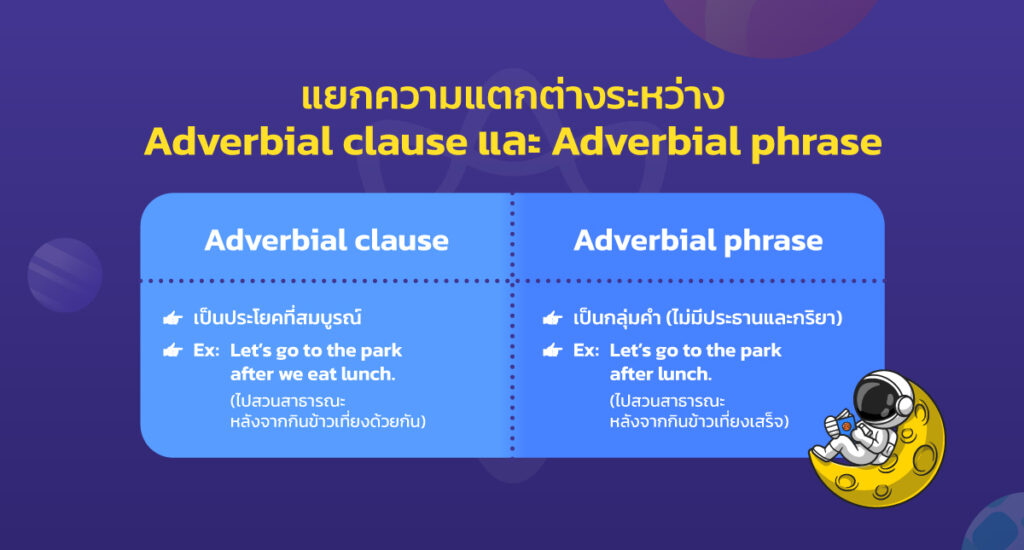
ประเภทของ Adverbial Clause ในภาษาอังกฤษ
วิเศษณานุประโยคเพื่อแสดงเวลา (Adverbial Clause of time)
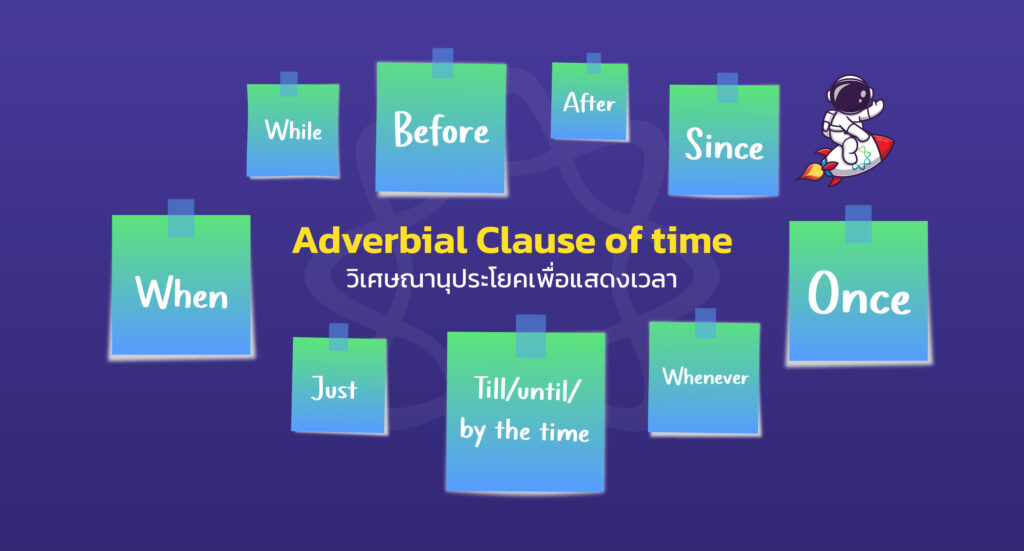
| วิเศษณานุประโยคเพื่อแสดงเวลา | แปล | ตัวอย่าง |
| Once | ครั้งหนึ่ง | Once he comes, you have to leave. (เมื่อเขามาคุณก็ต้องไป) |
| When | เมื่อ ตอน | When I visited him, she was there. (เมื่อฉันไปเยี่ยมเขา เธอก็อยู่ที่นั่น) |
| While | ในขณะที่ | While my brother is playing the guitar, I am painting. (ในขณะที่น้องชายกำลังเล่นกีตาร์ ฉันก็กำลังวาดรูปด้วย) |
| Before | ก่อน | Before going out, don’t forget to turn off the light. (ก่อนออกจากห้องอย่าลืมปิดไฟ) |
| After | หลังจาก | You should send them to his father after you have received them. (คุณควรส่งมันไปให้พ่อของเขาหลังจากที่คุณได้รับมันแล้ว) |
| Since | ตั้งแต่ | Since he graduated, he has done everything more carefully. (ตั้งแต่เขาเรียนจบเขาทำทุกอย่างอย่างระมัดระวังมากขึ้น) |
| Till/until/by the time | จนกระทั่ง | By the time we came back to the city again, he hadn’t agreed to meet her. (จนกระทั่งเรากลับมาถึงเมืองอีกครั้ง เขาก็ไม่ยอมพบเธอ) |
| Just as | ขณะที่ | Just as we received these items, we sent them to him immediately. (ขณะที่เราได้รับสิ่งของเหล่านี้แล้วเราก็ส่งไปให้เขาทันที) |
| Whenever | เมื่อไรก็ตาม | She cries whenever she misses her mother. (เมื่อไรก็ตามที่เธอคิดถึงแม่เธอก็จะร้องไห้) |
| No sooner …. than/Hardly/Scarcely … when | เมื่อกี้นี้ | No sooner had he gone out than he came back (เขาเพิ่งออกไปและกลับมาเมื่อกี้นี้) Hardly/Scarcely had she had a shower when the phone rang (เธอเพิ่งอาบน้ำเมื่อกี้นี้โทรศัพท์ก็ดังขึ้น) |

| แพ็กเกจ ELSA Speak Premium | ราคาเดิม | ข้อเสนอพิเศษ |
| ELSA Pro 1 ปี | 2.499 บาท | 1.935 บาท |
| ELSA Premium 1 ปี | 8.497 บาท | 4.290 บาท |
| ELSA Premium 3 เดือน | 4.548 บาท | 2.600 บาท |
| ELSA Premium 1 เดือน | 2.047 บาท | 1.435 บาท |
วิเศษณานุประโยคเพื่อบอกสถานที่ (Adverbial Clause of place)
| วิเศษณานุประโยคเพื่อแสดงสถานที่ | แปล | ตัวอย่าง |
| Where | ที่ไหน | We want to visit Bangkok, where we met each other. (พวกเราอยากไปเที่ยวกรุงเทพ ไปที่ที่เราเคยพบกัน) |
| Wherever | ที่ไหนก็ตาม | Wherever we visited, we took a lot of photos. (พวกเราไปเที่ยวที่ไหนก็ตาม พวกเราก็จะถ่ายรูปมาเยอะมาก) |
| Anywhere | ที่ไหนก็ตาม | Anywhere she goes, he will go with her. (เธออยากไปที่ไหนก็ตามที่เขาก็ไปด้วย) |
| Everywhere | ทุกที่ | We looked everywhere she could come. (เรามองหาทุกที่ที่เขาสามารถมาได้) |

วิเศษณานุประโยคเพื่อบอกเหตุผล (Adverbial Clause of reason)
| วิเศษณานุประโยคเพื่อบอกเหตุผล | แปล | ตัวอย่าง |
| Because/As/ Since | เพราะ | Because I invited her, she couldn’t refuse my invitation. (เพราะฉันชวนเขาแล้วเขาก็ปฏิเสธไม่ได้) |
| Since/As/ For | เนื่องจาก | Since/As/ For he is tired, he stays at home. (เนื่องจากเขาเหนื่อยเขาจึงอยู่ที่บ้าน) |
| Now that/ In that/ Seeing that | เพราะ | Now that I am in a foreign country, I visit my home once a year. (เพราะตอนนี้ฉันอยู่ต่างประเทศ ฉันจึงกลับบ้านเพียงปีละครั้งเท่านั้น) |
| On account of the fact that/ Due to the fact that | เนื่องจาก | On account of the fact that his leg is broken, he cannot play football. (เนื่องจากขาหักเขาจึงไม่สามารถเล่นฟุตบอลได้) |
| Seeing that | เมื่อเห็นว่า | Seeing that he is angry with her, I tell him the truth. (เมื่อเห็นว่าเขาโกรธเธอ ฉันจึงบอกความจริงกับเขา) |
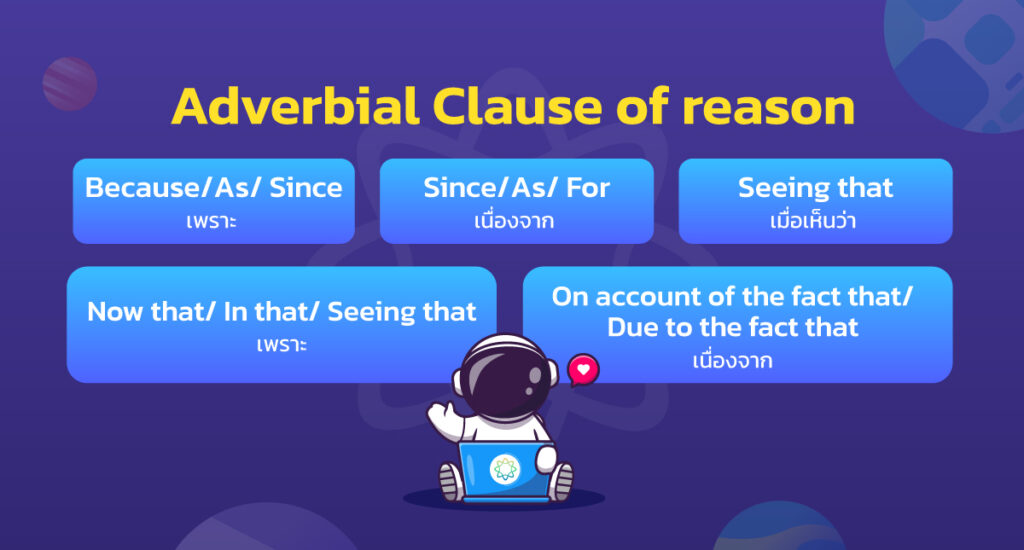
>>> Read more: Relative Clause คือ? โครงสร้าง หลักการใช้งาน ตัวอย่าง และแบบฝึกหัด
วิเศษณานุประโยคเพื่อแสดงวัตถุประสงค์ (Adverbial Clause of purpose)
| วิเศษณานุประโยคเพื่อแสดงวัตถุประสงค์ | แปล | ตัวอย่าง |
| So that/ In order that | เพื่อว่า | All of us are silent so that we can hear what is happening in the next room. (เราทุกคนเงียบเพื่อว่าจะได้ยินสิ่งที่เกิดขึ้นในห้องถัดไป) |
| In case/For fear that | ในขณะที่/เผื่อ | You should prepare everything, in case that you forget something when you are in a hurry. (เธอควรเตรียมทุกอย่างให้พร้อมก่อนเข้านอน เผื่อลืมอะไรเวลารีบ) |
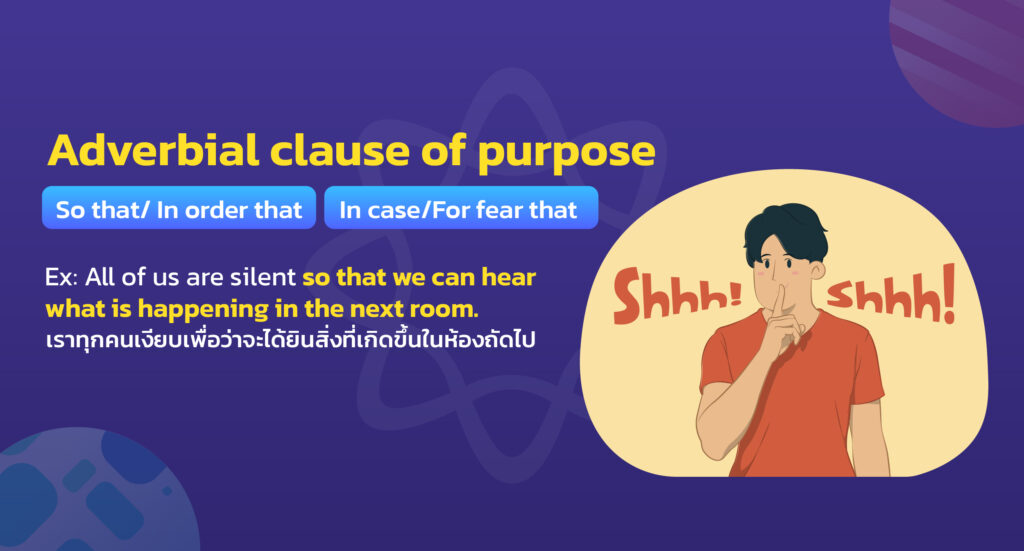
วิเศษณานุประโยคเพื่อแสดงการยอมรับ (Adverbial Clause of concession)
| วิเศษณานุประโยคเพื่อแสดงการยอมรับ | แปล | ตัวอย่าง |
| Although/ Even though/though/in spite of the fact that | ถึงแม้ว่า | Although she tries to hide what happened, we know about it. (ถึงแม้ว่าเธอจะพยายามซ่อนสิ่งที่เกิดขึ้น แต่พวกเราก็รู้ดี) |
| In spite of/despite + N phrase | แม้ว่า ทั้งๆ ที่ | Despite the bad result, she is not sad. (แม้ว่าผลจะออกมาไม่ดี แต่เธอก็ไม่เศร้า) |
| While/Whereas/Meanwhile | ในขณะที่ | I like cartoons while my brother likes comedy. (ฉันชอบการ์ตูน ในขณะที่น้องชายของฉันชอบตลก) |
| Nevertheless/Nonetheless | ขณะที่ | He doesn’t like her, nevertheless he decided to marry her. (เขาไม่ชอบเธอ แต่เขาตัดสินใจแต่งงานกับเธอ) |
| Whatever/Whoever/However/Wherever | …ก็ตาม | However sad I am, I always smile. (แม้จะเศร้าแค่ไหนก็ตามฉันก็ยิ้มได้เสมอ) |
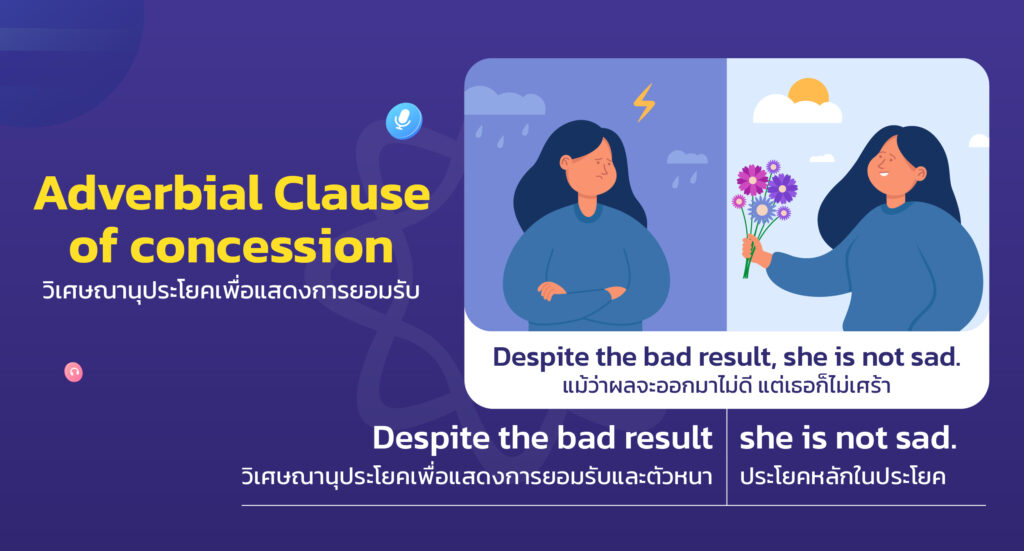
>>> Read more: Subordinating Conjunctions ในภาษาอังกฤษ กลุ่มคำที่พบบ่อยพร้อมแบบฝึกหัด
วิเศษณานุประโยคที่ใช้แสดงผล (Adverbial Clause of result)
| วิเศษณานุประโยคที่ใช้แสดงผล | แปล | ตัวอย่าง |
| So + ( much/ many/…) adj/adv that clause… | จนถึง | The concert was so loud that my ears were ringing for hours afterwards. (คอนเสิร์ตดังมากจนหูของฉันดังไปหลายชั่วโมงหลังจากนั้น) |
| Such + (a/ an) adj + N + that clause…. | จนถึง | She made such a delicious cake that everyone wanted a second slice. (เธอทำเค้กแสนอร่อยจนทุกคนอยากกินชิ้นที่สอง) |
| Therefore = Consequently = As a result = As a consequence | เนื่องจากนั้น | The roads were slippery due to the rain, therefore we had to drive slowly. (ถนนลื่นเนื่องจากฝนตก ดังนั้นเราจึงต้องขับรถช้าๆ) |
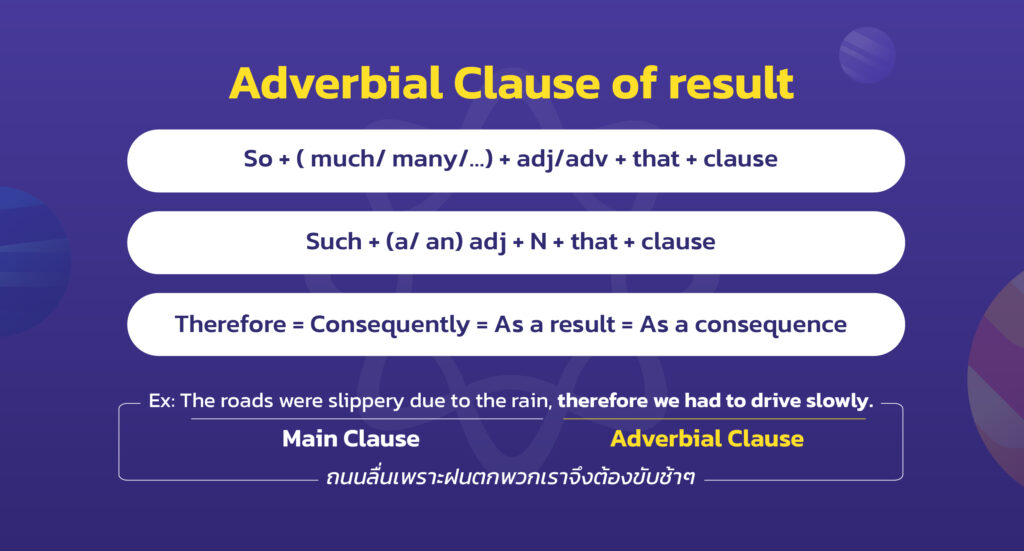
วิเศษณานุประโยคที่ใช้แสดงวิธีการ(Adverbial Clause of manner)
| วิเศษณานุประโยคที่ใช้แสดงวิธี | แปล | ตัวอย่าง |
| As/Like | เหมือนกับ | They dance like professionals on the stage. (พวกเขาเต้นเหมือนมืออาชีพบนเวที) |
| As if / As though | ราวกับว่า เหมือนกับว่า | She smiled at him as if she knew him well. (เธอยิ้มให้เขาเหมือนกับว่าเธอรู้จักเขาดี) The student answered the question confidently as though he knew the answer for sure. (นักเรียนตอบคำถามอย่างมั่นใจราวกับว่าเขารู้คำตอบแน่ชัด) |
>>> Read more: Adverb of manner คืออะไร? วิธีการใช้ Adverb of manner พร้อมตัวอย่าง
วิเศษณานุประโยคเพื่อบอกการเปรียบเทียบ (Adverbial clause of comparison)

| วิเศษณานุประโยคเพื่อบอกการเปรียบเทียบ | แปล | ตัวอย่าง |
| More than | มากกว่า | They managed to complete the marathon more quickly than they did in the previous year. (พวกเขาจัดการวิ่งมาราธอนได้สำเร็จเร็วกว่าปีที่แล้ว) |
| Less than | น้อยกว่า | There are less students in the class today than yesterday. (วันนี้มีนักเรียนในชั้นเรียนน้อยกว่าเมื่อวาน) |
| Just as | เช่นเดียวกัน | Just as a seed grows into a tree, so does a small idea grow into a great achievement. (ฉันใดเมล็ดพันธุ์ก็เติบโตเป็นต้นไม้ ความคิดเล็กๆ ก็สามารถเติบโตเป็นความสำเร็จอันยิ่งใหญ่ได้เช่นกัน) |
| The same as | เหมือนกับ | The new product has the same quality as the old one. (สินค้าใหม่มีคุณภาพเหมือนกับสินค้าเก่า) |
| Different from | ต่างจาก | American English is different from British English. (ภาษาอังกฤษแบบอเมริกันต่างจากภาษาอังกฤษแบบอังกฤษ) |
วิเศษณานุประโยคเพื่อบอกความขัดแย้ง (Adverbial clause of contrast)
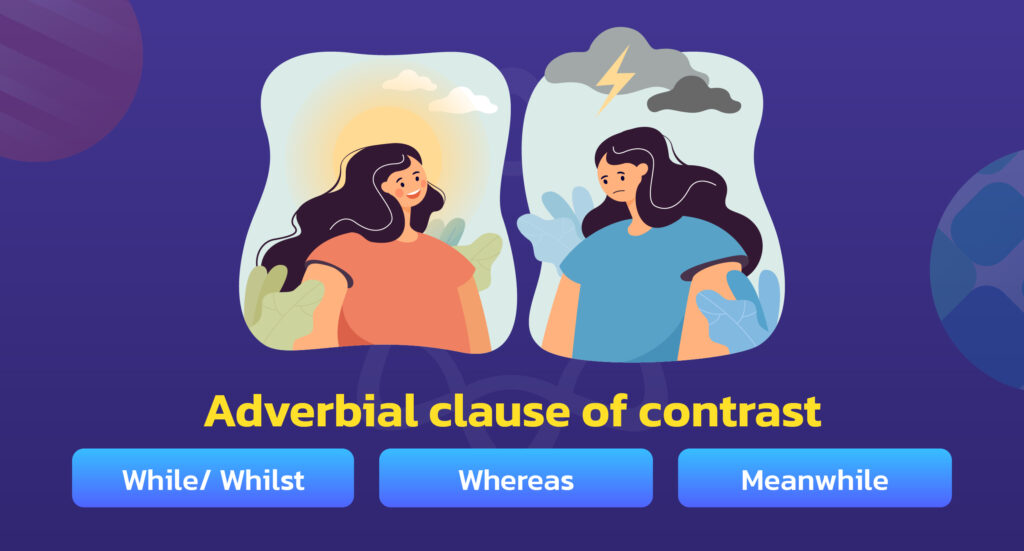
| วิเศษณานุประโยคเพื่อบอกความขัดแย้ง | แปล | ตัวอย่าง |
| While/ Whilst | ในขณะที่ | John is very rich while his friends are extremely poor. (จอห์นรวยมากในขณะที่เพื่อนของเขายากจนมาก) While some people work better with music, others do not. (ในขณะที่บางคนทำงานได้ดีกว่าเวลาอยู่กับดนตรีดนตรี แต่บางคนก็ทำไม่ได้) |
| Whereas | แต่จริงๆ | We thought she was arrogant, whereas in fact she was just very shy. (พวกเราคิดว่าเธอหยิ่ง แต่จริงๆ แล้วเธอแค่ขี้อายมาก) |
| Meanwhile | ขณะเดียวกัน | He continued going there. Meanwhile, his friends decided to go back home. (เขายังคงไปที่นั่น ขณะเดียวกันเพื่อนๆ ของเขาก็ตัดสินใจกลับบ้าน) |
วิเศษณานุประโยคที่ใช้แสดงเงื่อนไข (Adverbial clause of condition)
| วิเศษณานุประโยคที่ใช้แสดงเงื่อนไข | แปล | ตัวอย่าง |
| If | ถ้า | If you don’t come, I will go without you. (ถ้าคุณไม่มา ฉันจะไป) |
| Unless | ถ้าไม่ | Unless you learn hard, you can’t pass your exam. (ถ้าคุณไม่ตั้งใจเรียน คุณจะสอบไม่ผ่าน) |
| As long as | ตราบเท่าที่ | As long as you are hardworking, you will finish it. (ตราบใดที่คุณทำงานอย่างขยัน คุณก็จะทำมันให้เสร็จ) |

>>> Read more: If Clause ประโยคเงื่อนไข: โครงสร้าง วิธีใช้ แบบฝึกหัด และเคล็ดลับการท่องจำ
กรณีพิเศษของ Adverbial Clause
| กรณีพิเศษ | วิธีใช้ | ตัวอย่าง |
| คำกริยาคือ tobe (is/am/are) หรือกริยาเชื่อม (linking verb) เช่น just as, however, although, during, also,… | สามารถละเว้นประธานและกริยาได้ (เหลือเพียงคำคุณศัพท์/คำนามในประโยค) | Although my dad is tired, he still plays chess with me. => Although tired, my dad still plays chess with me. (แม้ว่าจะเหนื่อยแต่พ่อของฉันก็ยังเล่นหมากรุกกับฉัน) |
| ในกรณีวิเศษณานุประโยคเพื่อบอกเหตุผล | ละคำเชื่อมและประธาน (เหลือแต่คำกริยา) ในขณะเดียวกันคำกริยาก็ต้องเปลี่ยนเป็นรูป “Ving” หรือ “being” ตามลำดับ | Because I’m sick, I won’t be able to come to your birthday party. => Being sick, I won’t be able to come to your birthday party. (เพราะฉันป่วย เลยมางานวันเกิดคุณไม่ได้) |
| ในกรณีที่การกระทำของกริยาวิเศษณ์เกิดขึ้นก่อนประโยคหลัก | ลดลงอนุประโยคข้างต้นเป็น having + V(PII) | After finishing her degree, Maria decided to travel around Europe. => Having finished her degree, Maria decided to travel around Europe. (เมื่อสำเร็จการศึกษาแล้ว มาเรียจึงตัดสินใจเดินทางท่องเที่ยวไปรอบๆ ยุโรป) |
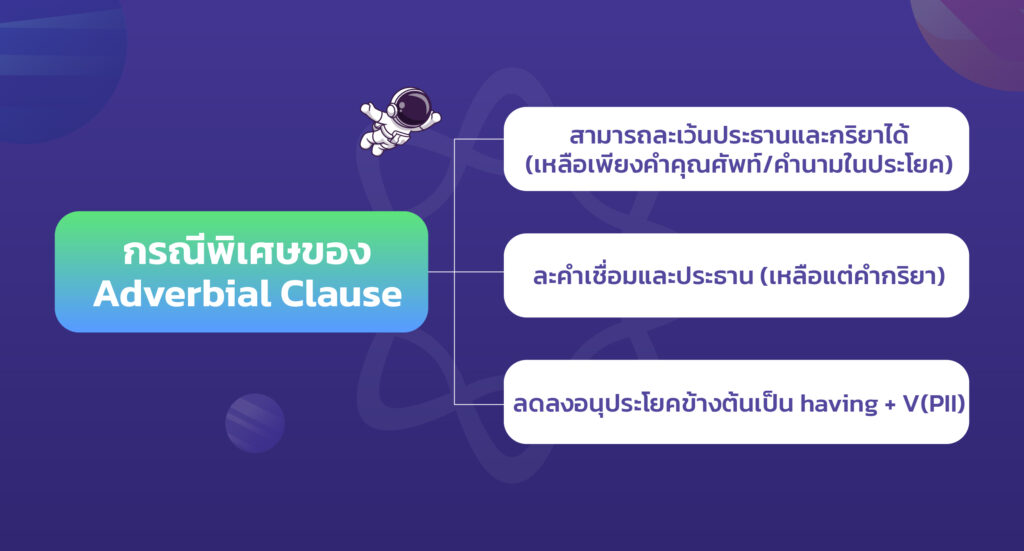
Adverbial Clause ลดลง
วิเศษณานุประโยคถูกตัดให้สั้นลงเมื่อทั้งสองประโยคในประโยคมีหัวข้อเดียวกันและมีคำสันธานเชื่อมกัน งั้นการลดลงอนุประโยคต้องทำอย่างไร มาเรียนรู้ด้วยตารางด้านล่างนี้
| แบบฟอร์มที่สั้นลง | วิธีใช้ | ตัวอย่าง |
| ด้วยประโยคที่ประธานเป็นผู้กระทำ | ประธานเดียวกัน –> ละเว้นประธาน- แทนที่+ ถ้า Verb –> Verb-ing+ ถ้า Verb tobe –> being | When my mother met this boy, she realized that he is her old friend. => When meeting this boy, she realized that he is her old friend. (เมื่อแม่ของฉันพบเขา แม่กลับจำเขาเป็นเพื่อนเก่าของแม่) |
| ถ้ามีประธานเดียวกัน –> ละคำเชื่อมและประธาน- แทนที่ Verb –> Verb-ing | When my mother met this boy, she realized that he is her old friend. => Meeting this boy, she realized that he is her old friend. (เมื่อแม่ของฉันพบเขา แม่กลับจำเขาเป็นเพื่อนเก่าของแม่) | |
| ด้วยประโยคที่ประธานเป็นผู้ถูกกระทำ | ละเว้นประธาน- แทนที่+ ถ้า Verb –> Verb-ing+ ถ้า Verb tobe –> being | As I am called a liar, I become sad. => As being called a liar, I become sad. (เมื่อถูกเรียกว่าคนโกหก ฉันก็เศร้าใจมาก) |
| ลดประธานและ tobe (ถ้าสองประโยคมีประธานเดียวกัน) | As I am called a liar, I become sad. => As called a liar, I become sad. (เมื่อถูกเรียกว่าคนโกหก ฉันก็เศร้าใจมาก) | |
| ลดประธาน tobe และคำเชื่อม (ถ้าสองประโยคมีประธานเดียวกัน) | As I am called a liar, I become sad. => Called a liar, I become sad. (เมื่อถูกเรียกว่าคนโกหก ฉันก็เศร้าใจมาก) |

Adverb clause แบบฝึกหัดพร้อมเฉลย
Adverb clause exercise
บทที่ 1 เติมคำที่เหมาะสมเพื่อสร้างประโยคกริยาวิเศษณ์
1. Although the movie received rave reviews, it failed to impress me due to its slow pacing.
=> …………….…………….…………….……………………….…………….…………
2. When I am stressed, I find it difficult to focus on anything else.
=> …………….…………….…………….……………………….…………….…………
3. Because he missed the bus, he was late for his meeting with the client.
=> …………….…………….…………….……………………….…………….…………
4. Even though he is a talented musician, he didn’t get accepted into the music school.
=> …………….…………….…………….……………………….…………….…………
5. As I was feeling sick, I decided to stay home instead of going to the party.
=> …………….…………….…………….……………………….…………….…………
6. As soon as I finish my work, I’ll join you for lunch.
=> …………….…………….…………….……………………….…………….…………
บทที่ 2 เลือกคำตอบที่ถูกต้องเพื่อสร้างประโยคกริยาวิเศษณ์
1. What did you do on Sunday? It was ………… day that I went to the lake.
A. Such nice
B. Such a nice
C. So nice
D. Very nice
2. Did you hear the phone ring last night?. I didn’t hear anything, I was ………… that I didn’t wake up.
A. Very tired
B. Such tired
C. So tired
D. Enough tired
3. Why wasn’t Mr. Fitzgerald offered a better room in the hotel?. I don’t know. It’s surprising how ………… important people are treated.
A. So
B. Such
C. A such
D. Such an
4. How many trips are there to Panama? Wonderful, except that we spent ………… money.
A. So much
B. Such much
C. Many
D. So many
5. What is your opinion of the Smiths?. They are ………… people.
A. Such an interesting
B. So interesting a
C. So interesting
D. Such interesting
6. Did you like the band last night?. Yes, ………… I bought their record”.
A. Such much
B. So much that
C. Very much that
D. Too much that
7. That’s a beautiful dress jean has on. She always wears ………… clothes.
A. Such a lovely
B. So lovely
C. Such lovely
D. So much lovely
8. Paul is a very competent salesperson. He’s ………… good that I am going to give him a raise and a promotion.
A. Definite
B. Definitely
C. So
D. So much
เฉลย
บทที่ 1
1. Although receiving rave reviews, it failed to impress me due to its slow pacing.
2. When stressed, I find it difficult to focus on anything else.
3. Missing the bus, he was late for his meeting with the client.
4. Even though a talented musician, he didn’t get accepted into the music school.
5. Feeling sick, I decided to stay home instead of going to the party.
6. On finishing my work, I’ll join you for lunch.
บทที่ 2
| 1. B | 2. C | 3. D | 4. A | 5. D | 6. B | 7. C | 8. C |
คำถามที่พบบ่อย
Adverbial Clause คืออนุประโยคไม่อิสระใช่ไหม?
ใช่ วิเศษณานุประโยคทั้งหมดเป็นอนุประโยคไม่อิสระ
ประเภทของ Adverbial Clause มีอะไรบ้าง?
วิเศษณานุประโยคทั่วไปมีดังต่อไปนี้
- วิเศษณานุประโยคเพื่อแสดงเวลา (Adverbial Clause of time)
- วิเศษณานุประโยคเพื่อบอกสถานที่ (Adverbial Clause of place)
- วิเศษณานุประโยคเพื่อบอกเหตุผล (Adverbial Clause of reason)
- วิเศษณานุประโยคเพื่อแสดงวัตถุประสงค์ (Adverbial Clause of purpose)
- วิเศษณานุประโยคเพื่อแสดงการยอมรับ (Adverbial Clause of concession)
- วิเศษณานุประโยคที่ใช้แสดงผล (Adverbial Clause of result)
- วิเศษณานุประโยคที่ใช้แสดงวิธีการ (Adverbial Clause of manner)
- วิเศษณานุประโยคเพื่อบอกการเปรียบเทียบ (Adverbial clause of comparison)
- วิเศษณานุประโยคเพื่อบอกความขัดแย้ง (Adverbial clause of contrast)
- วิเศษณานุประโยคที่ใช้แสดงเงื่อนไข (Adverbial clause of condition)
วิเศษณานุประโยคขึ้นต้นประโยคคืออะไร?
วิเศษณานุขึ้นต้นประโยค (บางทีได้เรียกว่าคำวิเศษณ์ขึ้นต้น) ปรากฏที่จุดเริ่มต้นของประโยค วิเศษณานุขึ้นต้นประโยคจะต้องตามด้วยลูกน้ำเสมอ
ตัวอย่าง Until, Leo comes back, we won’t be able to start cooking. (จนกว่าลีโอจะกลับมาเราจะทำอาหารไม่ได้)
วิธีการระบุวิเศษณานุประโยค?
วิเศษณานุประโยคใช้เพื่ออธิบายหรือขยายคำกริยา คำคุณศัพท์ หรือคำวิเศษณ์อื่นๆ มักใช้เพื่อเชื่อม 2 ประโยคเข้าด้วยกัน โดยใช้คำสันธาน เช่น as, like, once, when, until, by the time, whereas, just as,…
ด้านบนนี้คือความรู้ทั้งหมดเกี่ยวกับวิเศษณานุประโยค (Adverbial Clause) ในภาษาอังกฤษเพื่อให้เพื่อนๆได้เรียนรู้หวังว่าการแบ่งปันข้างต้นจะช่วยให้คุณเข้าใจประโยคประเภทนี้ได้ดีขึ้น นอกจากนั้น อย่าลืมติดตาม ELSA Speak เพื่ออัปเดทความรู้ภาษาอังกฤษล่าสุดทุกวันนะ






